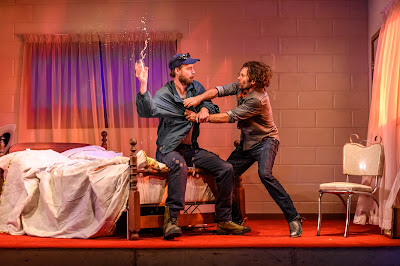On the cover of its programme the
Blyth Festival lets you know exactly what it offers: Live, Original, Canadian,
Theatre. That is admirable truth in advertising. The Blyth Festival is in its
45th season and that alone is an admirable achievement.
This year the Festival offers seven productions, two of them world premieres. Colleen Curran’s Cakewalk
is listed as an encore but the play had its premiere at the Festival in 1984 so
it is very much a Blyth play.
Director Kelli Fox describes it
as a “deliciously silly comedy” and she is spot on. The play takes place in a
small town where the residents are having a festival to celebrate Canada Day.
One of the events is a cake contest and the first prize is a trip to Paris. The
play is set in the community hall where a few of the cake-making contestants
are gathered. We hear the music, announcements and commotion of the festive
activities outside.
The comedy is built around five contestants
and the daughter of one of them who are interesting and just plain funny. Leigh
(Rachel Jones) is an attractive and decent teacher who has a distinctive
position in society that proves to be problematic – she is a nun. She will face
conflicting situations that are awkward and amusing.
The snooty Augusta (Caroline
Gillis) is the mother of the about-to-be-married Tiffany (Lucy Hill) and is
putting the wedding cake in the contest. Tiffany is a tennis-playing spoiled
bimbo who is getting married next day and she does not want her wedding cake in
the contest. Lock up the cake, lock up Tiffany, lock up one of the other
contestants in the handy closet.
Martha (Rebecca Auerbach) plays
baseball and she comes to the fair in her team uniform because the game was
delayed. She gets barbs about her attire but she gives back as much as she
takes. We also have the self-righteous, bitchy and nasty Girl Scout den mother
Ruby (Catherine Fitch. She is scheming and dishonest, and will do anything to
win.
On the nice side of the spectrum
we have Taylor (Nathan Howe), an archeologist, a decent guy and a klutz. He is
the only male contestant and he is entering the Tut Coconut Cake but he has
other issues to contend with. He has a serious reaction to Leigh. He can’t make
it up a few steps without stumbling or falling and he wants to tell Leigh how
he feels about her but she does not want to hear it because she is already
spoken for – to the convent.
Howe is a master of physical
comedy and he and Jones produce some wonderful comedy as we watch their romance
blossom.
There are enough complications to
keep the plot going in high and the higher gear as we wonder what will happen
next and laughing heartily much of the time. Kelli Fox of Shaw and Stratford
Festivals fame has changed gears herself and gone into directing and does a
superb job of handling the cast and comedy with a light touch. The cast is
wonderfully responsive to the comedy and the audience responded with
appreciation.
The action takes place on a single
set - a room in the community centre with several doors, a stairwell and a
closet. Set Designer Laura Gardner gives us the flavour of every community
center we have ever seen.
Oh, yes. The cake contest. Every
contestant has a cogent reason and desire for wanting to win. In the end the
contest is resolved quite satisfactorily. Tiffany probably marries
what’s-his-name and we have no doubts about the future happiness of Leigh and
Taylor.
The winning cake was made by
…..go see the play.
_________
Cakewalk by Collen
Curran continues until August 10, 2019 at the Blyth Memorial Hall, Blyth,
Ontario, blythfestival.com
James Karas is the Senior Editor - Culture of The Greek Press. www.greekpress.ca






















